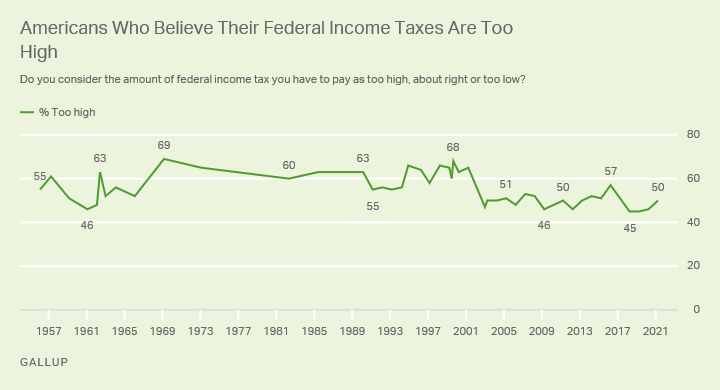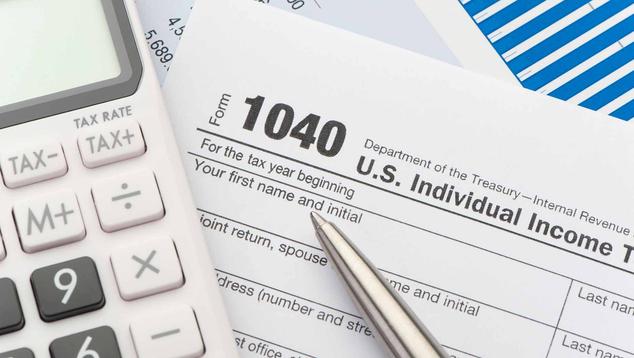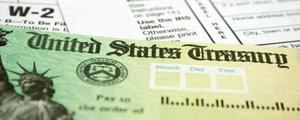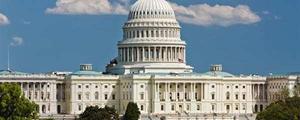Half of Americans say the amount of federal income taxes they pay is too high, according to a recent Gallup review by my colleague Lydia Saad. This is lower than in the past. Gallup has been asking about taxes since 1956, and the "too high" percentage reached an all-time high of 69% in 1969. As recently as 1999, 68% of Americans said their taxes were too high. But that percentage has dropped over the past two decades after the tax cuts passed into law in the first years of the George W. Bush administration. After the Donald Trump tax cut of 2017, the percentage saying their taxes were too high reached the lowest point in Gallup's history.

Line graph. Americans' views of the amount they pay in income taxes. 50% of Americans in 2021 say the amount they pay in income taxes is too high.
The question wording -- "Do you consider the amount of federal income tax you have to pay as too high, about right or too low?" -- leaves the choice of the standard people use in evaluating their taxes up to them. The data over time show that one of these standards is apparently the nation's overall tax-rate situation, given that views that one's taxes are too high seem to drop, at least modestly, after highly publicized tax cuts are put into place. The interesting question remains: What else might affect Americans' perceptions of their tax burden?
View of One's Taxes Relating to One's Income
One consideration in judging one's taxes would be the actual amount paid in taxes each year. A logical hypothesis: The more people pay in taxes, the higher the probability they would perceive their taxes as too high.
Unfortunately, we don't have a direct measure of actual taxes paid, partly because many Americans doubtless don't know the exact dollar amount they pay in taxes each year (without looking it up) or what their taxes are as a percentage of their total income.
We can, however, use self-reported household income as a proxy for taxes paid, since the "real world" dollar amount of taxes, and the percentage of income paid in taxes, both increase as the taxpayer's income increases.
The latest 2021 Gallup survey shows little difference in views of one's personal federal income tax burden between broad categories of those making $40,000 or less and those making $100,000 or more. Similarly, there is little difference in the perception that the amount of taxes one pays is fair between those two income groups.
An aggregate of data collected over the past 10 years (2012-2021) provides larger sample sizes and more detailed income categories for these questions. Here we find that 59% of those making $150,000 or more say their federal tax bill is too high, above the overall average of 50% across this 10-year span. The percentage in this income category who say their federal income taxes are unfair is 48%, significantly higher than the overall average of 38%. These are not huge differences, but they do suggest that Americans making significantly above the national median income have somewhat of an enhanced tendency to complain that their federal taxes are too high.
The views of the bottom group -- those making less than $40,000 a year -- are in some ways the most interesting. The real-world data show that this group pays little in federal tax on a percentage basis, and the majority pays no federal taxes at all. Yet, over the past 10 years, some 46% of those making under $40,000 a year have said the amount they pay in federal income taxes is too high, just a few points below the overall average. And 35% say their taxes are unfair, again just a few points below the average.
Ideology a Big Driver of Americans' Views of Their Taxes
Our analysis, as we have seen, shows modest support for the hypothesis that views of one's income tax burden directly reflect what one pays in taxes. When we turn to ideology, however, we find significantly more powerful relationships -- including a 26-percentage-point difference between conservatives' and liberals' perceptions that their income tax is too high (58% of conservatives say it is, compared with 32% of liberals) in Gallup's most recent data, from 2021. Similar ideological differences are evident in views of the fairness of one's taxes. (And Gallup's recent review found almost identical differences between Republicans and Democrats.)
Thus, many Americans answer this question about their taxes based on their underlying ideological views of the concept of taxes in general and/or their views of the taxes others pay. This is not surprising, given that much research shows that Americans' ideology -- along a conservative-to-liberal spectrum -- appears to be a fundamental factor in determining their views on much that goes on around them across a variety of social, cultural, economic and personal dimensions. (Why some people end up being conservative and some liberal is itself the subject of much research, including some provocative suggestions that ideological differences reflect underlying genetic differences1.)
Of course, debate over taxation by the federal government goes back to the founding of the nation in the late 1700s -- and has persisted ever since. In fact, I would argue that disparate views of taxation are one of the most significant and defining distinctions between conservatives and liberals throughout U.S. history, up to and including today's political environment.
For Democrats, Ideology More Significant Than Income in Determining Views of Taxes
To what degree are both ideology and income related to views of one's taxes? An analysis of data from the 2012-2021 aggregate provides interesting answers to that question. Ideology interacts with household income differently for conservatives and liberals. Among conservatives, those making at least $150,000 are more likely than conservatives making less than $40,000 to think their taxes are too high (as might be expected). But among liberals, the lowest-income people are more likely to think their taxes are too high, at 42%. Only 33% of the highest-income liberals feel this way.
For the highest-income Democrats, in short, ideology is apparently the driving force in determining their views of their own taxes, while for conservative high earners, both ideology and income have an effect.
Bottom Line
Americans' views of their own taxes are complex but are clearly and significantly related to their underlying ideology, in most cases more so than to what they actually pay in taxes. Conservatives are more likely than liberals to say their personal federal taxes are too high at every income level.
The same ideological and partisan differences carry over to perceptions of the taxes paid by high-income Americans and by corporations, as we would expect. Recent Pew research shows that Democrats are much more bothered than Republicans by the fact that some corporations and some wealthy people don't pay their "fair share" in taxes2, as Gallup research has similarly shown in the past.
All of this analysis of views of taxation is a nontrivial matter, given the Biden administration's current push for tax increases on certain higher-income groups and on corporations, and Senate Minority Leader Mitch McConnell's response that GOP leaders have no interest in rolling back any aspect of the 2017 tax cuts. This gulf between Democratic and Republican leaders' views of taxation, as we have seen, comes as no shock. The word "taxes" evokes substantially different reactions from Americans on the left compared with those on the right, and the resolution of these differing perspectives will continue to be a major challenge for the nation's political system any time leaders propose changing the way the federal government taxes its citizens.
Footnotes
[1] Denworth, L. (2020, October 26). Conservative and liberal brains might have some real differences. scientificamerican.com. https://www.scientificamerican.com/article/conservative-and-liberal-brains-might-have-some-real-differences/.
[2] Dunn, A., & Van Green, T. (2021, April 30). Top tax frustrations for Americans: The feeling that some corporations, wealthy people don't pay fair share. Pew Research Center. https://www.pewresearch.org/fact-tank/2021/04/30/top-tax-frustrations-for-americans-the-feeling-that-some-corporations-wealthy-people-dont-pay-fair-share/.




